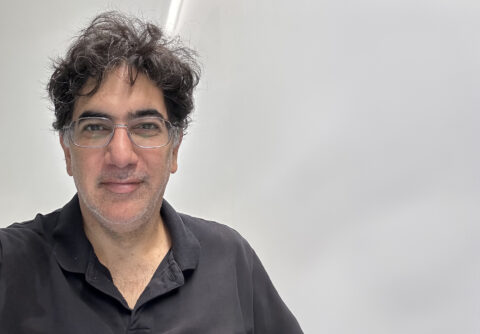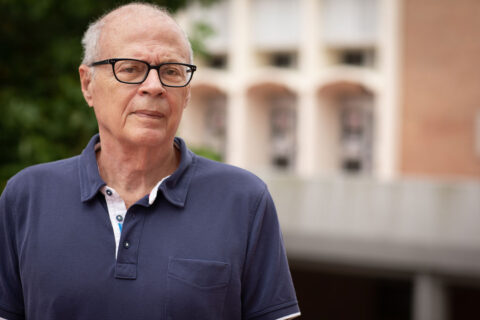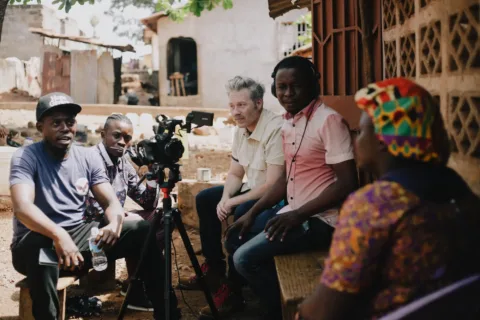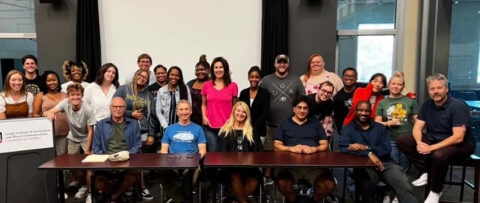Low-Residency MFA in Screenwriting
Low-Residency MFA in Screenwriting

The world of narrative writing is dynamic and innovative, and I bring a world of experience to students who want to learn the craft of a finely written story.
Overview
In just two years, write a marketable screenplay and earn your MFA in Narrative Media Writing with a concentration in Screenwriting from the Grady College of Journalism and Mass Communication, home of the Peabody Awards and one of the top journalism schools in the country. This two-year, low-residency MFA in Screenwriting Degree program is designed to train writers who will be produced.
The low-residency MFA in Screenwriting Degree program offers students an unparalleled opportunity to develop screenwriting skills that will equip them for long and varied careers. The program features a committed and diverse roster of accomplished screenwriters and other industry professionals who work closely with students to inspire and support each writer’s emerging craft and voice.
Low-residency MFA in Screenwriting Degree graduates are prepared to write screenplays for major motion picture and television companies or teach writing at the university level.
A concentration in narrative nonfiction is also available.
Low-Residency Screenwriting Degree Program Details
UGA’s unique low-residency MFA in Screenwriting Degree program allows students to complete most of the screenwriting degree requirements online while developing their skills and talents under the guidance of experienced faculty writing mentors. This committed and diverse roster of accomplished authors, literary agents, and other industry professionals work closely with students to inspire and support each writer’s emerging craft and voice. The online low-residency format also perfectly simulates the life of the writer — offering two things that every successful writer needs: a strong, supportive community as well as the freedom and solitude to write at home.
Over the course of the screenwriting degree program, students build a substantive portfolio reflecting their individual styles and interests. Students receive individualized instruction from assigned mentors who help them to develop and hone crucial career skills, ultimately completing at least one marketable screenplay.
The screenwriting degree programs’ director — award-winning producer Nate Kohn assembled a diverse group of writing mentors who will challenge students to do their best work, to explore the role of the writer in society, and to use their writing to make a difference in the diverse communities in which they live.
The Screenwriting concentration is designed for feature film and television writers who want to take their writing skills to the next level and who understand the advantages that the MFA degree affords. The screenwriting degree program is aimed at both experienced writers and passionate first-time screenwriters who want to explore new creative opportunities in telling stories that matter for large and small screens. The screenwriting degree program allows students to work one-on-one with experienced mentors who are currently vital members of the entertainment community and who understand the challenges and opportunities found in new technologies. Most of all, the program is for writers who value the power, purpose, and meaning of stories well told.
How Many Times Will I Have To Come To Campus While Pursuing A Low-Residency MFA In Screenwriting?
Each 15-week semester begins with a campus residency that features a demanding program of writing workshops in which students’ work is discussed and evaluated. The residencies run for six days, with students immersing themselves in an intensive writing environment for a full, enriching week. The flexible schedule accommodates employed students who have two weeks of paid leave — while providing them with the opportunity to build a sense of community with their peers and to engage in serious, focused study with their faculty mentors. Each residency includes daily seminars and craft lectures, as well as panel discussions and readings by faculty members, visiting writers, editors, agents, and other publishing and entertainment-industry professionals.
Why Choose UGA Online’s Low-Residency MFA In Screenwriting?
The Screenwriting concentration is for feature film and television writers who want to take their writing skills to the next level. Screenwriting graduates are prepared to write screenplays for major motion picture and television companies or teach writing at the university level. Over the course of the screenwriting degree program, students build a substantive portfolio, reflecting their individual styles and interests. Students receive individualized instruction from assigned mentors who help them to develop and hone crucial career skills, ultimately completing at least one marketable screenplay.
What Can I Do With A Low-Residency MFA In Screenwriting?
As one of the best online low-residency MFA programs in the nation, the Screenwriting MFA prepares graduates to write screenplays for major motion pictures and television companies or teach writing at the university level. A concentration in Narrative Nonfiction is also available.
What Are The Benefits Of UGA Online’s A Low-Residency MFA In Screenwriting?
The MFA in Screenwriting is offered through the Grady College of Journalism and Mass Communication, home of the Peabody Awards and one of the top journalism schools in the country.
As an online graduate of the University of Georgia, you become part of an extensive alumni network and a longstanding tradition of striving for excellence in every pursuit. For over two hundred years, we have been on a mission of leadership and service, and today, we are ranked #16 among the nation’s top public institutions by U.S. News & World Report.
Online students are granted the same access to online resources, career services, library services, and technical support as all enrolled University of Georgia students to help ensure that they are equipped for success in every way.
Accreditations
The University of Georgia is accredited by the Southern Association of Colleges and Schools Commission on Colleges (SACSCOC) to award baccalaureate, master’s, specialist, and doctoral degrees. The University of Georgia also may offer credentials such as certificates and diplomas at approved degree levels. Questions about the accreditation of the University of Georgia may be directed in writing to the Southern Association of Colleges and Schools Commission on Colleges at 1866 Southern Lane, Decatur, GA 30033-4097, by calling (404) 679-4500, or by using information available on SACSCOC’s website (www.sacscoc.org).
Grady College of Journalism and Mass Communication is accredited by the Accrediting Council on Education in Journalism and Mass Communications (ACEJMC).
Admissions
Total Hours Required to Earn Degree: 36 (credit hours)
Screenwriting Degree Program Admission Requirements:
Students applying to The University of Georgia must be accepted by the Graduate School. Persons holding a bachelor’s degree from any institution accredited by the proper regional accrediting association are eligible to apply for admission to the Graduate School.
Applications are accepted starting in the Fall semester prior to anticipated Fall semester matriculation. Although the Graduate Record Examination (GRE) is not required for admission to this program, requirements include:
- Personal Statement
- A 20-page Writing Sample
- Three (3) Letters of Recommendation
- Resume or Curriculum Vitae
Screenwriting Degree Program Application Checklist:
- Application – Submit online to the Graduate School Admissions. Application fee: $75 (waived for US veterans).
- Select Campus – Online
- Select Intended Program – MFA, Narrative Media Writing (College of Journ-Mass Comm) [MFA_NMWR_ONL]
- Select Area of Emphasis – Screen Writing
- Statement of Purpose – Submit a one-page statement of purpose online to the Graduate School. The statement of intent should clarify the candidate’s relevant background, interests, and goals in relation to the program.
- Writing Sample – Submit a 20-page sample of your best writing (nonfiction, fiction or screenplay) in a PDF document to the Grady Graduate Administrative Assistant, anne.hurne@uga.edu. The writing sample may be a single work or a portfolio of various articles, essays, short screenplays, etc. Program faculty will assess the quality of each applicant’s work — a major criterion for admission.
- Resume or curriculum vita – Submit online to the Graduate School.
- Transcripts – Submit unofficial transcripts from all institutions attended as part of the online application. Send official transcripts after you are offered admission
- Letters of Recommendation – Submit three letters of recommendation online to graduate school. Letters should be from individuals who can evaluate the applicant’s scholarly ability and potential for success in a graduate program. Preferably at least two of them are from faculty who have instructed the applicant in a previous program of study. The application will prompt your recommenders to submit their letters electronically.
Application Deadlines
Screenwriting Program
Fall: April 1
Cost
Tuition & Fees
Tuition rates and student fees may change each year.
Based on the 2024-25 credit-hour cost, a person who had completed this program at the recommended pace would have paid $36,324 in tuition. Reference the Bursar’s Special Hourly eRates for Online Programs page to identify the current credit hour rate for your program of interest.
Please use the Estimated Cost Calculator on the Bursar’s Office website to calculate one academic (Fall/Spring) year’s tuition.
This program is an E-Rate program, so choose “yes” for the E-Rate line item within the calculator.
Fees for those students enrolled in exclusively online programs are $422 per semester.
Potential additional costs include:
- Textbooks
- Exam proctoring fees
- Technology upgrades
The complete cost of attendance can be found at https://osfa.uga.edu/costs/.
Financial Aid
Visit the Office of Student Financial Aid for information about financial assistance.
Corporate Assistance
Consult your employer about the availability of tuition reimbursement or tuition assistance programs.
Military Assistance
Active-duty military, veterans, and military families should visit Veterans Educational Benefits to take full advantage of available financial assistance and educational benefits.
Technology Requirements
- Computer with current operating system (Windows, Mac, or Linux). Additional peripherals such as webcam, headphones, and microphone are required.
- High-speed internet access.
Curriculum
Low-Residency Format
UGA’s two-year, low-residency MFA program embraces the changing needs of students — particularly working professionals — by allowing them to complete their screenwriting degree without having to relocate. Our program offers students the chance to continue their lives while learning the skills crucial to advancing their careers. The low-residency format also perfectly simulates the life of the writer — offering two things that every successful writer needs: a strong, supportive community as well as the freedom and solitude to write.
Each 15-week semester begins with a campus residency that features a demanding program of writing workshops in which student work is discussed and evaluated. The residencies run for eight days, with students immersing themselves in an intensive writing environment for a full, enriching week. The flexible schedule accommodates professionals who have two weeks of paid leave — while providing students with the opportunity to build a sense of community with their peers and to engage in serious, focused study with their faculty mentors. Each residency includes daily seminars and craft lectures, as well as panel discussions and readings by faculty members, visiting writers, editors, agents and other publishing and entertainment-industry professionals.
Screenwriting Degree Program Structure
All courses in the student’s screenwriting concentration area are required. There are no prerequisites. The Screenwriting Degree program offers students opportunities to attend craft lectures, seminars and panel discussions across screenwriting and narrative nonfiction concentrations during the residencies.
Screenwriting Concentration
| Fall Term | Spring Term | |
|---|---|---|
| Year 1 | Writing for the Screen I: Explorations & Beginnings Screenplay Craft, Criticism & Reflection I: Directed Readings | Writing for the Screen II: Developing the ScreenplayScreenplay Craft, Criticism & Reflection II: Directed Readings |
| Year 2 | Writing for the Screen IV: Final Thesis Screenplay, Screenplay Craft, Criticism & Reflection IV: Seminar Preparation | Writing for the Screen II: Developing the Screenplay, Screenplay Craft, Criticism & Reflection II: Directed Readings |
| Final Residency | Writing for the Screen V: Public Reading |
Faculty
The Residency
The MFA Fall residency will be held in Athens, Georgia, from Sunday, July 26th to Saturday, August 1, 2026.
The residency portions of the MFA Screenwriting Degree program run for eight days, with students immersing themselves in an intensive writing environment for a full, enriching week. The residency provides students with the opportunity to build a sense of community with their peers and to engage in a serious, focused study with their faculty mentors. Each residency includes daily seminars and craft lectures, as well as panel discussions and readings by faculty members, visiting writers, editors, agents, and other publishing and entertainment industry professionals.
Browse our residency photo album on Flickr!
News & Events
Football film directed by UGA Screenwriting MFA alumnus has national premiere
January 12, 2026“Signing Tony Raymond,” a film written, directed and produced by Glen Owen (ABJ ’90), a UGA alumnus and current Low-Residency MFA in Screenwriting student, will have its national premiere on Jan. 16, 2026.
Tamlin Hall named director of MFA Film, Television and Digital Media program
December 18, 2025Tamlin Hall, an Emmy Award-winning filmmaker, director, producer, educator and non-profit founder, has been named the new director of the University of Georgia Master of Fine Arts in Film, Television and Digital Media.
UGA MFA Alumni Bring Short Film to Austin Film Festival
October 21, 2025When Tricia Horvath’s short film premieres at the prestigious Austin Film Festival this fall, it won’t just mark her directorial debut: it will also shine a light on the growing strength of the University of Georgia’s MFA programs in Screenwriting and Film. Four UGA-connected films are screening at Austin this year, including Stripper Moms, created by Horvath, a recent graduate of the Low-Residency MFA in Screenwriting, with cinematographer Elias (Eli) Saliba, a 2022 graduate of UGA’s MFA in Film, and produced by Taylor Potter (MFA Screenwriting 2023). For a relatively new set of programs, having multiple alumni in such a reputable festival is a marked achievement. “When you’re looking at this program as being only 10 years old,” Horvath said, “I feel like it’s pretty remarkable that it’s standing strong and holding its own against others that are considered the top-tier MFAs for screenwriting.”
Contact Information
Contact us using the request for information form or call 706-452-7947.










